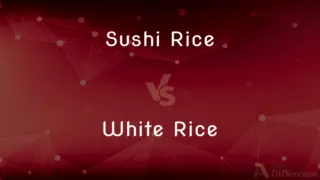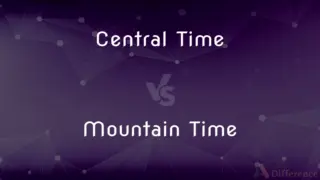Island vs. Continent — What's the Difference?
By Tayyaba Rehman — Updated on October 31, 2023
An Island is a landmass surrounded by water, smaller than a continent; a Continent is one of the planet's main, vast land masses.

Difference Between Island and Continent
Table of Contents
ADVERTISEMENT
Key Differences
An Island is a piece of land that is completely surrounded by water and is smaller in size when compared to a Continent, which is one of Earth's several large, primary divisions of land.
While Islands can be found in oceans, seas, rivers, or lakes, Continents are expansive regions, often housing various countries and spanning various climatic zones.
The geological formation of Islands can result from volcanic activity, sediment accumulation, or coral growth, whereas Continents are generally believed to have been formed from Earth's tectonic movements.
Both Islands and Continents play crucial roles in biodiversity. Islands may house unique species not found elsewhere, while Continents feature a wide range of habitats, from deserts to rainforests.
Comparison Chart
Size
Smaller
Larger
ADVERTISEMENT
Surroundings
Completely surrounded by water
Mostly surrounded by water, but can border other continents
Formation
Volcanic activity, sediment, coral growth
Tectonic plate movements
Number worldwide
Thousands
Seven
Examples
Maui, Iceland
North America, Africa
Compare with Definitions
Island
A body of land surrounded by water.
Hawaii is an archipelago made up of several islands.
Continent
Larger than an island.
While Australia is both a country and a continent, it's considerably larger than any island.
Island
Smaller than a continent.
While Greenland is the world's largest island, it's much smaller than any continent.
Continent
Floats on tectonic plates.
The movement of the continent of South America westward led to the formation of the Andes.
Island
Can be found in various water bodies.
The island in the middle of the lake is a popular picnic spot.
Continent
Contains multiple countries.
The European continent comprises many countries, from Spain to Russia.
Island
Often formed from volcanic activity.
The eruption formed a new island off the coast.
Continent
A continent is one of several large landmasses. Generally identified by convention rather than any strict criteria, up to seven regions are commonly regarded as continents.
Island
An island or isle is any piece of subcontinental land that is surrounded by water. Very small islands such as emergent land features on atolls can be called islets, skerries, cays or keys.
Continent
One of the principal land masses of the earth, usually regarded as including Africa, Antarctica, Asia, Australia, Europe, North America, and South America.
Island
Abbr. Isl. or Is. or I. A landmass, especially one smaller than a continent, entirely surrounded by water.
Continent
Continent The mainland of Europe. Used with the.
Island
An unattached kitchen counter providing easy access from all sides.
Continent
Exercising continence.
Island
A raised curbed area, often used to delineate rows of parking spaces or lanes of traffic.
Continent
Each of the main continuous land-masses on the earth's surface, now generally regarded as seven in number, including their related islands, continental shelves etc.
Island
The superstructure of a ship, especially an aircraft carrier.
Continent
A large contiguous landmass considered independent of its islands, peninsulas etc. Specifically, the Old World continent of Europe–Asia–Africa. See the Continent.
Island
(Anatomy) A cluster of cells differing in structure or function from the cells constituting the surrounding tissue.
Continent
(obsolete) Land (as opposed to the water).
Island
To make into or as if into an island; insulate
A secluded mansion, islanded by shrubbery and fences.
Continent
Exercising self-restraint; controlled, temperate with respect to one's bodily needs or passions, especially sex, urination and/or defecation.
Island
A contiguous area of land, smaller than a continent, totally surrounded by water.
Continent
Not interrupted; connected; continuous.
A continent fever
Island
(by extension, in place names) A contiguous area of land, smaller than a continent, partially surrounded by water; A peninsula; A half-island.
Despite its name, Barry Island is actually a peninsula
Continent
(obsolete) Serving to restrain or limit; restraining; opposing.
Island
An entity surrounded by other entities that are very different from itself.
An island of colors on a butterfly's wing
Continent
Serving to restrain or limit; restraining; opposing.
Island
A superstructure on an aircraft carrier's deck.
Continent
Exercising restraint as to the indulgence of desires or passions; temperate; moderate.
Have a continent forbearance till the speed of his rage goes slower.
Island
A traffic island.
The island in the middle of a roundabout
Continent
Abstaining from sexual intercourse; exercising restraint upon the sexual appetite; esp., abstaining from illicit sexual intercourse; chaste.
My past life
Hath been as continent, as chaste, as true,
As I am now unhappy.
Island
(by extension, West Midlands dialect) A roundabout; A traffic circle.
Dunton island, near Birmingham, is one of the most confusingly labelled islands in the U.K.
In Coventry, you will often hear people say: “Turn right at the island”.
Continent
Not interrupted; connected; continuous; as, a continent fever.
The northeast part of Asia is, if not continent with the west side of America, yet certainly it is the least disoined by sea of all that coast.
Island
A bench, counter, etc., that is not connected to a wall or other furniture and which can be used from any side.
Continent
That which contains anything; a receptacle.
The smaller continent which we call a pipkin.
Island
(government) An unincorporated area wholly surrounded by one or more incorporated areas.
Continent
One of the grand divisions of land on the globe; the main land; specifically (Phys. Geog.), a large body of land differing from an island, not merely in its size, but in its structure, which is that of a large basin bordered by mountain chains; as, the continent of North America.
Island
(grammar) A phrase from which a wh-word cannot be extracted without yielding invalid grammar.
Continent
One of the large landmasses of the earth;
There are seven continents
Pioneers had to cross the continent on foot
Island
(transitive) To surround with water; make into an island.
Continent
The European mainland;
Englishmen like to visit the Continent but they wouldn't like to live there
Island
(transitive) To set, dot (as if) with islands.
Continent
Having control over urination and defecation
Island
(transitive) To isolate.
Continent
Abstaining from sexual intercourse;
Celibate priests
Island
A tract of land surrounded by water, and smaller than a continent. Cf. Continent.
Continent
One of Earth's primary land masses.
Africa is a continent known for its diverse cultures and wildlife.
Island
Anything regarded as resembling an island; as, an island of ice.
Continent
Has diverse climates and terrains.
The continent of North America spans from the Arctic to the Tropics.
Island
To cause to become or to resemble an island; to make an island or islands of; to isle.
Island
To furnish with an island or with islands; as, to island the deep.
Island
A land mass (smaller than a continent) that is surrounded by water
Island
A zone or area resembling an island
Island
May have unique ecosystems.
The Galápagos Islands are known for their unique wildlife.
Common Curiosities
Is every landmass surrounded by water an Island?
Not necessarily; if it's large enough, it's a Continent.
Are all Islands formed from volcanic activity?
No, Islands can also form from sediment accumulation or coral growth.
Which is the largest Continent?
Asia is the largest continent by both area and population.
How many Continents are there?
There are seven continents on Earth.
Can Islands be found in lakes?
Yes, Islands can be found in oceans, seas, rivers, and lakes.
Can an Island be as big as a Continent?
No, by definition, a Continent is larger than an Island.
Can Islands merge together?
Yes, through geological processes, islands can merge or split.
Does every Continent contain multiple countries?
Not always; for example, Australia is both a continent and a country.
Can an Island be uninhabited?
Yes, many islands around the world are uninhabited.
Which is the largest Island?
Greenland is the world's largest island.
Do Continents move?
Yes, due to tectonic plate movements, continents slowly drift.
Are Continents always touching each other?
No, some Continents are separated by oceans.
Are all Islands popular tourist destinations?
No, while many are popular, others are remote or restricted.
How do Continents affect climate?
Continents can influence climate patterns, like monsoons or desert formation.
Why aren't Europe and Asia considered separate Continents by some?
They're part of the same landmass; their division into two continents is based on cultural and historical factors.
Share Your Discovery

Previous Comparison
Keurig vs. Tassimo
Next Comparison
Anonym vs. AnonymousAuthor Spotlight
Written by
Tayyaba RehmanTayyaba Rehman is a distinguished writer, currently serving as a primary contributor to askdifference.com. As a researcher in semantics and etymology, Tayyaba's passion for the complexity of languages and their distinctions has found a perfect home on the platform. Tayyaba delves into the intricacies of language, distinguishing between commonly confused words and phrases, thereby providing clarity for readers worldwide.















































